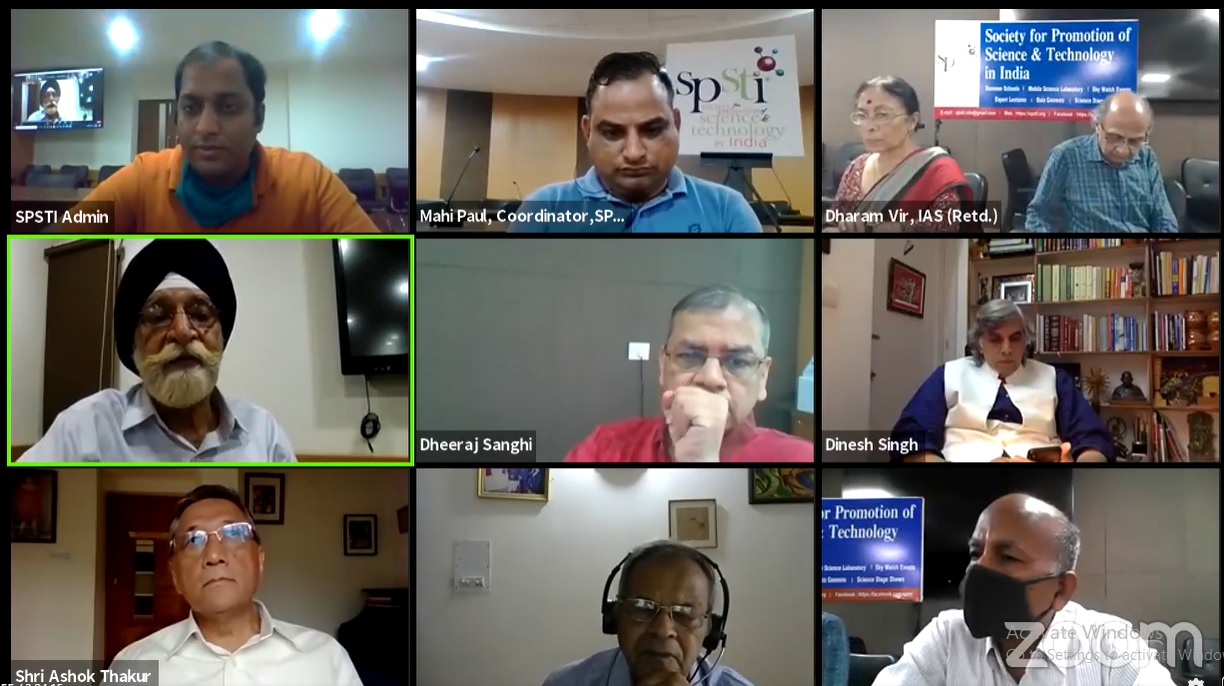The recently rolled out National Education Policy has created excitement in all sections of society. Three organizations joined together to hold a web-based panel discussion on the new National Education Policy 2020. The last policy was introduced in the year 1986, followed by a few amendments in the year 1992. The new policy has come after a gap of thirty-four years.
The panel discussion was organized by the Society for Promotion of Science and Technology in India in association with the Department of Education, Panjab University, Chandigarh; Punjab Engineering College, Chandigarh and National Academy of Sciences India (Chandigarh Chapter). This session took place on Higher Education today while an earlier session was conducted on School Education on Aug 25. These events are supported by the Department of Science and Technology, Chandigarh Administration.
Today’s session saw the participation of a number of experts directly associated with various aspects of the policy document. It was coordinated by Prof. Arun K. Grover, former Vice-Chancellor, Panjab University and was chaired by Shri Dharam Vir, IAS (Retd.), President SPSTI.
Prof. Keya Dharamvir, General Secretary, SPSTI, Prof. I. B. S. Passi, Chairman, Advisory Committee, NASI Chandigarh Chapter and Prof. Latika Sharma, Dept. of Education, PU and Prof. Kirandeep, Chairperson, Dept. of Education, PU joined the panel as members of the organizing committee. The panel discussion was broadcast live on Zoom and Facebook.
The first panelist to express his views was Shri Ashok Thakur, Former Secretary, Higher Education, Govt. of India. He said that NEP-2020 happens to be continuation of earlier education policies and changes particularly the upcoming trends of holistic broad based interdisciplinary education and idea of single regulator have been retained. He also expressed concerns about lack of skill education and commercialization of higher education.
Prof. Jaspal Singh Sandhu, Vice-Chancellor, Guru Nanak Dev University, Amritsar who spent considerable time as Secretary UGC, felt that the single regulatory body as envisage in NEP-2020 would get rid of multiplicity of instructions and policies but it would also face problems due to lack of control over funds which UGC had. He further stated that the most substantial change is that the NEP would bring about is the change in regulation which in turn will come about with strong will on part of the government and passion on part of those who implemented.
Prof. Dinesh Singh, renowned mathematician and Ex-Vice-Chancellor of Delhi University recalled Mahatma Gandhi’s Talisman “whenever you are in doubt or when the self becomes too much with you, apply the following test: Recall the face of the poorest and the weakest man or women whom you may have seen and ask yourself if the step you contemplate is going to be of any use to him or her…., then you will find your doubts and yourself melt away.” The four year undergraduate program was envisaged and knowledge in action, designed as an enabling program to take care of real world needs of the students. NEP gives the system enough flexibility to frame in various branches of knowledge as well as skills.
Next Prof. Dheeraj Sanghi, Director, PEC Chandigarh extolled the NEP for its bold step towards classification of HEIs as research based, teaching based and autonomous colleges. He expressed doubts about the feasibility of a 50% GER by 2035.
Brig. (Dr.) R.S. Grewal, former VC, Chitkara University talking on skilling aspects stated that all the skill development courses at present are only partially successful. Part of that reason was that society looks upon blue color jobs. We need to start campaign for change of mindsets towards vocational education, as we did for girl child. Inspite of possibilities of funds in higher education, there is scope of bringing huge change.
Prof. C.B. Sharma, Prof. of Education, IGNOU came in end made pertinent remarks about why JEE & NEET need exams to be held at this time as declaration of zero year would be bigger disaster.
An audience of more than one thousand connected via Facebook and Zoom. It was followed by a lively session of questions which were answered willingly and enthusiastically by the learned panelists. The Panjab Engineering College provided all the facilities such as Conference Hall along with digital arrangements.
Watch Complete Panel Discussion
Live Panel Discussion on new National Education Policy-2020 on Higher Education
Posted by Society for Promotion of Science & Technology in India (SPSTI) on Thursday, August 27, 2020

